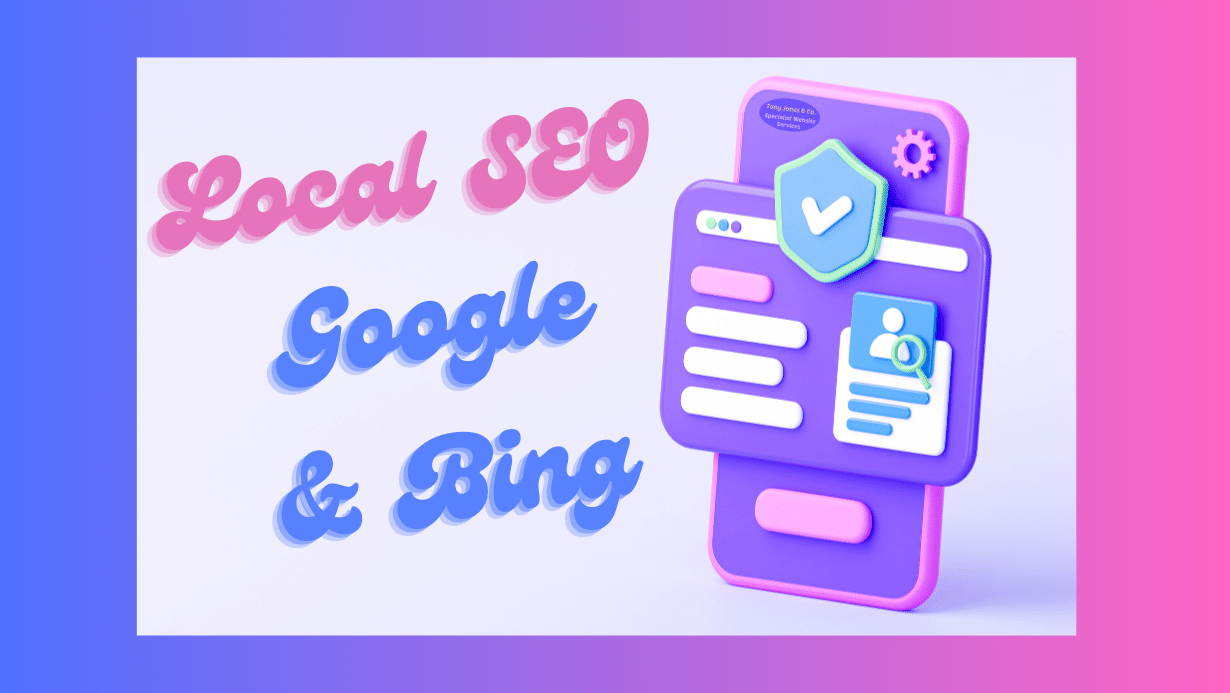Web Designer Wrexham, Professional Website Services - Tony Jones CITP, FBCS.
Having a FAQs Schema on your Website and Its Importance for SEO
An in-depth exploration of FAQs Schema, its SEO benefits, implementation methods, best practices, and real-life examples. It also highlights the importance of FAQs Schema in voice search optimization, making it a comprehensive resource for web designers, website owners, and SEO enthusiasts.

In today's fast-paced digital world, having a strong online presence is vital for businesses and individuals alike. A well-designed website can serve as a powerful tool to connect with your target audience and achieve your goals. As a seasoned web design professional with over 30 years of experience, I understand the significance of SEO (Search Engine Optimization) in ensuring that your website receives the visibility it deserves.
In this comprehensive guide, we will dive deep into the world of FAQs Schema and explore its pivotal role in enhancing your website's SEO performance. We will unravel what FAQs Schema is, how it operates, and why it holds immense importance for the success of your website.
Table of Contents
- Understanding FAQs Schema
- How FAQs Schema Benefits SEO
- Implementing FAQs Schema on Your Website
- Best Practices for FAQs Schema
- FAQs Schema and User Experience
- Measuring the Impact of FAQs Schema
- FAQs Schema: Your SEO Boost
- Real-Life Examples of FAQs Schema Implementation
- FAQs Schema Plugins and Tools
- FAQs Schema in Voice Search Optimization
1. Understanding FAQs Schema
FAQs Schema, also known as FAQpage Schema, is a structured data markup language that provides search engines with specific information about frequently asked questions (FAQs) and their corresponding answers on your website. It enables search engines to comprehend the content of your FAQs section more effectively, which can lead to improved search results listings.
2. How FAQs Schema Benefits SEO
The inclusion of FAQs Schema on your website offers several distinct advantages for SEO:
2.1 Improved Click-Through Rates
Rich snippets generated by FAQs Schema can make your search listings more attractive and informative, leading to higher click-through rates from search engine users [1].
2.2 Enhanced Visibility
FAQs Schema can help your content appear in featured snippets, commonly referred to as "position zero" in search engine results. This enhanced visibility can significantly boost organic traffic to your website.
2.3 Better User Experience
Clear, organized FAQs, enriched with Schema markup, can enhance the overall user experience. When visitors find answers to their questions quickly and efficiently, they are more likely to stay on your site longer, reducing bounce rates.
2.4 Voice Search Compatibility
As voice search continues to gain popularity, FAQs Schema can make your content more accessible to voice search queries. Voice assistants like Siri, Alexa, and Google Assistant often rely on structured data to provide accurate answers.
3. Implementing FAQs Schema on Your Website
Implementing FAQs Schema on your website can be accomplished through several methods:
3.1 Manual Implementation
You can add the Schema markup manually to your HTML code, ensuring that your FAQs are correctly tagged and structured. This method provides complete control over the Schema markup.
3.2 CMS Plugins
If your website is built on a content management system (CMS) like WordPress, there are various plugins available that simplify the process of adding FAQs Schema. Popular plugins include Yoast SEO and Rank Math.
3.3 Schema Markup Generators
Online tools and generators can assist you in creating the necessary Schema markup for your FAQs. These tools often provide a user-friendly interface for generating structured data.
4. Best Practices for FAQs Schema
To maximize the benefits of FAQs Schema, it's essential to follow best practices:
4.1 Concise and Relevant FAQs
Keep your FAQs concise and relevant to your target audience. Avoid overwhelming visitors with an excessive number of questions.
4.2 Header Tags
Use appropriate header tags (H2 or H3) for each question in your FAQs. This helps search engines understand the hierarchy of your content.
4.3 Informative Answers
Ensure that the answers to your FAQs are clear, informative, and directly address the questions. High-quality content is critical for SEO success.
4.4 Testing and Validation
After implementing FAQs Schema, use Google's Structured Data Testing Tool to validate your markup. This ensures that search engines can correctly interpret your structured data [3].
5. FAQs Schema and User Experience
FAQs Schema not only enhances SEO but also contributes to a positive user experience. Well-structured FAQs make it easy for visitors to find answers to their questions quickly. This, in turn, can reduce bounce rates and improve overall engagement on your website.
6. Measuring the Impact of FAQs Schema
To assess the impact of FAQs Schema on your website's SEO performance, monitor key metrics such as:
- Click-Through Rates (CTR): Check if rich snippets generated by FAQs Schema result in higher CTR from search engine results.
- Organic Traffic: Analyze whether the implementation of FAQs Schema leads to increased organic traffic to your site.
- Rankings: Monitor your website's search engine rankings, particularly for FAQ-related queries.
- User Engagement: Examine how user engagement metrics, such as time on page and bounce rates, change after implementing FAQs Schema.
Over time, you should see improvements in these areas if your FAQs Schema implementation is effective.
7. FAQs Schema: Your SEO Boost
In conclusion, FAQs Schema is a valuable tool in the toolkit of any web designer or website owner seeking to enhance their website's SEO performance. By providing structured data about frequently asked questions, you can improve click-through rates, visibility, and user experience. Implementing FAQs Schema and adhering to best practices can lead to significant SEO benefits, helping your website stand out in the competitive online landscape.
As a web design professional, your mission is not only to create visually appealing websites but also to ensure they perform exceptionally well in search engine rankings. FAQs Schema is one of the tools that can assist you in achieving that goal.
Therefore, do not hesitate to incorporate FAQs Schema into your web design projects, and watch as your clients' websites rise to the top of search engine results, ultimately boosting their online success.
8. Real-Life Examples of FAQs Schema Implementation
To better understand the practical application of FAQs Schema, let's explore a couple of real-life examples:
Example 1: Online Retailer
An online clothing retailer may have an FAQs section addressing common customer inquiries. By implementing FAQs Schema, the retailer's FAQ page can appear as a rich snippet in search results, showcasing frequently asked questions and answers directly within the search listing.
Example 2: Healthcare Website
A healthcare website offering medical advice and information may use FAQs Schema to display answers to common health-related questions. This can result in featured snippets that provide valuable health insights to users searching for medical information.
9. FAQs Schema Plugins and Tools
There are several plugins and tools available to simplify the process of adding FAQs Schema to your website:
- Yoast SEO: A popular WordPress plugin that includes a structured data block for FAQs Schema.
- Rank Math: Another WordPress plugin with built-in support for FAQs Schema markup.
- Schema Markup Generators: Online tools that allow you to generate Schema markup for FAQs by inputting relevant information.
Using these tools, you can streamline the implementation of FAQs Schema and enjoy its SEO benefits.
10. FAQs Schema in Voice Search Optimization
As voice search continues to shape the way users interact with search engines, FAQs Schema plays a crucial role in voice search optimization. Voice assistants like Siri, Alexa, and Google Assistant rely on structured data to provide concise and accurate answers to voice queries. By incorporating FAQs Schema into your website, you can ensure that your content is voice-search-friendly, catering to the growing number of users who rely on voice-activated devices.
In conclusion, FAQs Schema is a versatile and powerful tool that not only enhances your website's SEO but also contributes to a seamless user experience and voice search optimization. Whether you are a web design professional or a website owner, embracing FAQs Schema can elevate your online presence and propel you ahead in the digital landscape.
In conclusion,
FAQs Schema is a powerful tool that web designers and website owners should not overlook. By implementing structured data markup for frequently asked questions, you can boost your website's SEO, enhance user experience, and increase visibility in search engine results.
This guide has provided a comprehensive overview of FAQs Schema, from its basic understanding to practical implementation and best practices. Whether you're an SEO enthusiast or a web design professional, embracing FAQs Schema can set you on the path to a more successful online presence.
So, don't hesitate to incorporate this valuable tool into your web design projects, and watch as your website climbs the ranks in search engine results, ultimately leading to greater online success.
Please don't hesitate to ask any further questions through our contact page.
More reading on the subject.
- Neil Patel - FAQ Schema: A Beginner's Guide
- Search Engine Journal - FAQ Schema: A Guide For Beginners
- SEO Clarity - Best Practices for the FAQ Schema
- FlowMatters - What Are The FAQs for SEO and How You Can Implement Them
- StraffeSites - The Right Semantic Markup for Blog Posts: SEO & HTML
- Titan Growth - 5 Ways FAQ Schema Markup Can Amplify Your SEO
Share on:
Questions or further information; please call Tony 07990 797302
About the author Tony Jones CITP FBCS:
An experienced and qualified Web Designer based in Wrexham, a Chartered IT Professional and a Fellow of the British Computer Society.
Contact us
More news and articles: - Websites, Design, SEO, Artificial Intelligence, anything Digital Technology.











